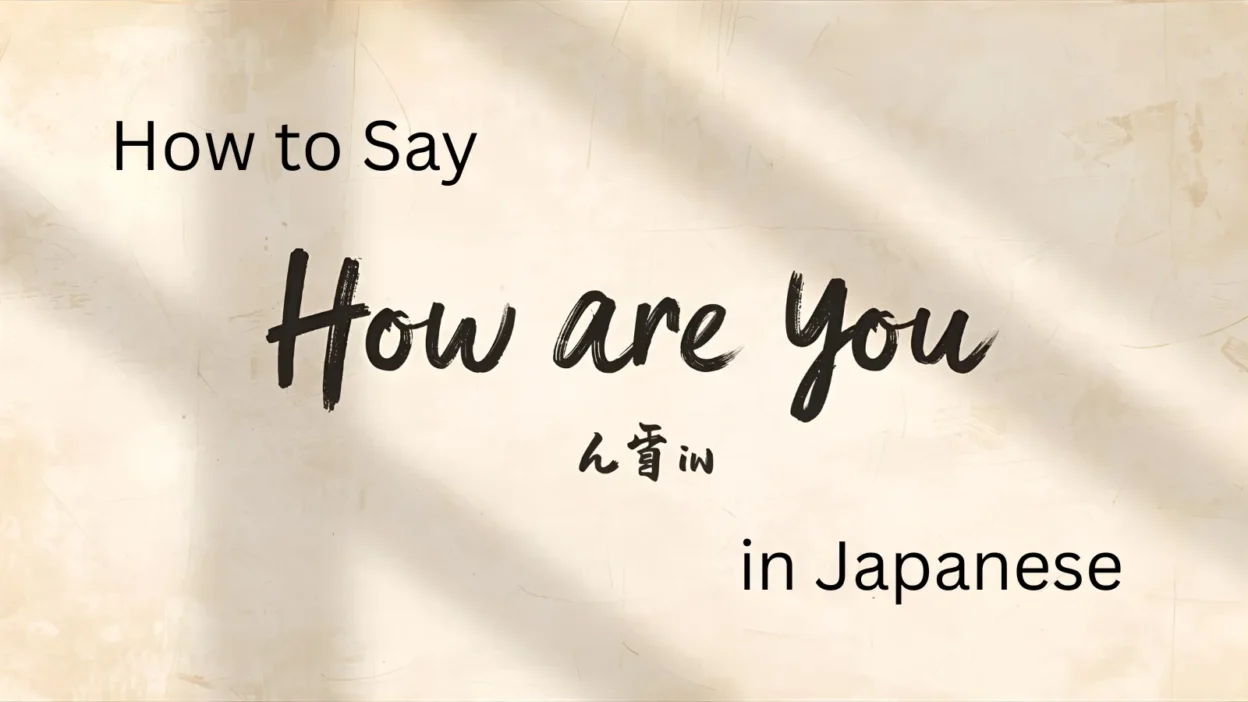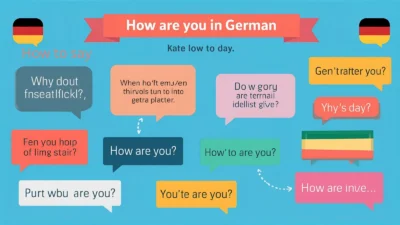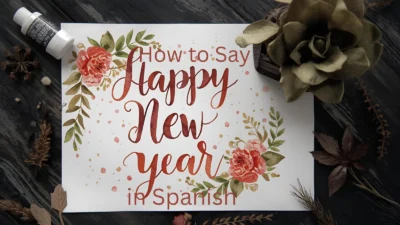Learning how to say How are you in Japanese is an important step if you want to connect politely and naturally with native speakers. While English often uses How are you? casually, Japanese has several variations that change based on formality, tone, and relationship.
Whether you’re greeting a friend, speaking to a teacher, or meeting someone new, knowing the right phrase will help you show respect and build stronger connections.
Say How Are You in Japanese
Here’s a 15-phrases table for different ways to say How are you? in Japanese with meanings, phrases, pronunciation, and usage:
15 phrases table for How to Say How Are You in Japanese
| # | English Phrase | Japanese Phrase | Pronunciation | Usage / Context |
|---|---|---|---|---|
| 1 | How are you? | お元気ですか | o-genki desu ka | Polite, common greeting |
| 2 | How’s it going? | 調子はどう | chōshi wa dō | Informal, with friends |
| 3 | Are you well? | 元気? | genki? | Very casual |
| 4 | How have you been? | お元気でしたか | o-genki deshita ka | Polite, after time apart |
| 5 | How are things? | どうしてる | dō shiteru | Friendly, casual |
| 6 | How are you feeling? | 気分はどう | kibun wa dō | Asking about feelings |
| 7 | Are you okay? | 大丈夫? | daijōbu? | Casual, caring |
| 8 | How’s life? | 人生はどう | jinsei wa dō | Casual, light humor |
| 9 | How’s your day? | 今日の調子はどう | kyō no chōshi wa dō | Everyday use |
| 10 | How are you doing lately? | 最近どうですか | saikin dō desu ka | Polite, everyday |
| 11 | How are you (formal)? | ご機嫌いかがですか | go-kigen ikaga desu ka | Very formal, business |
| 12 | How do you feel today? | 今日の気分はどう | kyō no kibun wa dō | Casual, friendly |
| 13 | How are you holding up? | 元気にしてる | genki ni shiteru | Casual concern |
| 14 | How’s everything? | 全部どう | zenbu dō | Informal |
| 15 | What’s up? | よ!元気? | yo! genki? | Very casual, slangy |
1. お元気ですか? (O-genki desu ka?) – Are you well?

Origin:
This is the textbook version of “How are you?” and is formal. “Genki” means healthy or lively.
Example:
👤 User A: お元気ですか?
👤 User B: はい、元気です。ありがとうございます。
(Yes, I’m well. Thank you.)
Use: Formal situations, emails, or speaking to elders.
2. 元気? (Genki?) – You good?
Origin:
A casual version of “O-genki desu ka?” used among friends and equals.
Example:
👤 User A: やっほー、元気?
👤 User B: うん、元気だよ!そっちは?
(Yep, I’m good! You?)
Use: Informal, friendly greeting.
3. 調子はどう? (Chōshi wa dō?) – How’s it going?

Origin:
“Chōshi” means condition or rhythm. This phrase sounds natural among colleagues and friends.
Example:
👤 User A: 久しぶり!調子はどう?
👤 User B: 悪くないよ。そっちは?
(Not bad. You?)
Use: Informal and modern; common in daily chats.
4. 最近どう? (Saikin dō?) – How have you been lately?
Origin:
“Saikin” means recently. This is often used when you haven’t seen someone in a while.
Example:
👤 User A: 最近どう?忙しい?
👤 User B: まあね、でも元気!
(Yeah, kind of, but I’m doing well!)
Use: Friendly, used when catching up.
5. 調子いい? (Chōshi ii?) – Things going well?

Origin:
A casual take on #3. It literally asks, “Is your condition good?”
Example:
👤 User A: 調子いい?
👤 User B: 最高!いい感じ!
(Great! Feeling good!)
Use: Informal, good for energetic conversations.
6. 大丈夫? (Daijōbu?) – You okay?
Origin:
Used when someone might not be okay. Often more of a check-in than a general greeting.
Example:
👤 User A: 顔色悪いけど、大丈夫?
👤 User B: うん、ちょっと疲れてるだけ。
(Yeah, just a little tired.)
Use: Concerned tone; not a casual hello.
7. どうしたの? (Dō shita no?) – What’s wrong?
Origin:
More direct than “Daijōbu?”, this is used if someone seems upset or sick.
Example:
👤 User A: 元気ないね、どうしたの?
👤 User B: 昨日ほとんど寝てないんだ。
(I barely slept last night.)
Use: Concerned or intimate; not for casual check-ins.
8. 調子悪い? (Chōshi warui?) – Not feeling well?

Origin:
Directly asks if something’s wrong. Common when someone looks off.
Example:
👤 User A: なんか調子悪い?
👤 User B: うーん、ちょっとね…。
(Mmm, kind of…)
Use: Casual and slightly concerned.
9. 体調はどう? (Taichō wa dō?) – How’s your physical condition?
Origin:
A slightly formal and respectful way to ask how someone feels physically.
Example:
👤 User A: 手術の後、体調はどうですか?
👤 User B: おかげさまで、だいぶ良くなりました。
(Thanks to you, I’ve improved a lot.)
Use: Polite, especially for health-related follow-ups.
10. うまくいってる? (Umaku itteru?) – Is everything going smoothly?
Origin:
Literally means “Is it going well?” Often used in context like work, studies, or relationships.
Example:
👤 User A: 新しい仕事、うまくいってる?
👤 User B: まあまあかな。まだ慣れてないけど。
(So-so. Still getting used to it.)
Use: Conversational, thoughtful check-in.
11. 変わりない? (Kawari nai?) – Nothing’s changed?
Origin:
Traditional phrasing, asking if everything is the same. Often used in written or older speech.
Example:
👤 User A: しばらく会ってないね。変わりない?
👤 User B: うん、特に何も。そっちは?
(Nothing much. How about you?)
Use: Polite and nostalgic.
12. 元気にしてた? (Genki ni shiteta?) – Have you been well?
Origin:
Past tense version of “Genki?”, often used when meeting someone after a long time.
Example:
👤 User A: 久しぶり!元気にしてた?
👤 User B: うん、ずっと元気だったよ!
(Yeah, I’ve been doing well!)
Use: Warm and friendly; perfect for reunions.
13. 何かあった? (Nani ka atta?) – Did something happen?
Origin:
Used when you suspect a problem or change in mood.
Example:
👤 User A: 元気ないね…何かあった?
👤 User B: うーん、実はね…。
(Umm… actually, yeah…)
Use: Concerned tone, not a typical greeting.
14. 元気そうだね! (Genki sō da ne!) – You look well!
Origin:
Instead of asking, it’s a statement that opens conversation warmly.
Example:
👤 User A: わあ、元気そうだね!
👤 User B: ありがとう!最近いい感じだよ。
(Thanks! Things have been going well.)
Use: Friendly and positive opener.
15. よく寝れた? (Yoku nereta?) – Did you sleep well?
Origin:
Common in close relationships (like couples or family) as a daily check-in.
Example:
👤 User A: おはよう!よく寝れた?
👤 User B: うん、ぐっすり!
(Yeah, I slept like a baby!)
Use: Intimate, for close daily interactions.
FAQs:
Q1: What is the most common way to say “How are you?” in Japanese?
A: The most common phrase is “お元気ですか?” (Ogenki desu ka?) — it means “Are you well?”
Q2: Is “Ogenki desu ka?” casual or formal?
A: It is polite. Use it with adults, teachers, or people you’re not close to.
Q3: What’s a casual way to say “How are you?” to friends?
A: Say “元気?” (Genki?) — short and friendly.
Q4: How do I respond if I’m doing well?
A: Say “元気です。” (Genki desu.) meaning “I’m good.”
Q5: How do I respond if I’m not feeling well?
A: Say “元気じゃない。” (Genki janai.) meaning “I’m not well.”
Q6: Do Japanese people say “How are you?” often?
A: Not as much as English speakers. It’s usually used after some time apart, not daily.
Q7: Can I use these phrases in texting?
A: Yes. You can text “元気?” (Genki?) to a friend.
Q8: How do I say “How have you been?”
A: Say “最近どう?” (Saikin dō?) meaning “How have you been recently?”
Q9: How do I say “Are you okay?”
A: Say “大丈夫?” (Daijōbu?)
Q10: What’s a friendly tone version?
A: “どうしてる?” (Dō shiteru?) meaning “How’s everything?”
Conclusion:
Mastering how to say How are you in Japanese helps you go beyond basic greetings and speak more naturally with native speakers.
From casual expressions with friends to formal phrases in professional settings, using the right version shows cultural awareness and respect. This simple step will make your Japanese conversations warmer and more authentic.

Sophia Mitchell is a passionate content writer known for creating clear, engaging, and informative articles.
She focuses on delivering well-structured content that is easy for readers to understand and trust.
Sophia Mitchell currently contributes quality writing to repliesnest.com, helping readers find accurate answers quickly.



